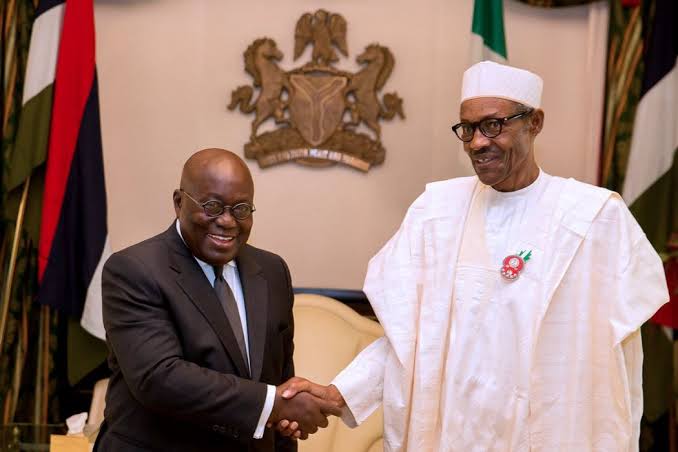Ghana Proposes Meeting Between Presidents Buhari, Akufo-Addo On Strained Relations

Following heightening tensions in relations between Nigeria and Ghana, the Ghanaian Government has proposed a meeting between President Muhammadu Buhari of Nigeria and Ghana’s Nana Akufo-Addo to resolve the issues in contention.
The two West African countries are wrangling over accusation of harassment of Nigerian citizens in Ghana, especially traders whose shops were closed by the Ghanaian Government.
The tensions broke out after reports that shops owned by Nigerian traders were shut by Ghanaian authorities for failure to pay one million dollars equity stipulated by the Ghana Investment Promotion Council.
Nigeria’s Minister of Foreign Affairs Geoffrey Onyeama, had held talks with the Charge d’Affaires of Ghana to Nigeria, Ms Iva Denoo, on the matter with no progress made.
On Friday, Nigeria’s Minister of Information and Culture Lai Mohammed issued a statement outlining cases of harassment of Nigerians and other offences against Nigeria and stressed that Nigeria would not tolerate future acts.
In a statement on Sunday, Ghana’s Minister of Information, Kojo Oppong Nkrumah, suggested that Buhari and Akufo-Addo to develop an immediate framework to ensure citizens of both countries exercise their full rights, “while respecting the sovereignty and laws of both countries.”
“Ghana and Nigeria, as they have been doing, must continue to work together for a successful West Africa.” The statement added.
The two West African leaders are committed to ensuring continued friendly ties between the two nations, Mkrumah said, citing the historic relations both countries had shared ove the years.
Unfortunately, relations between Nigeria and Ghana have been tainted by bitter gestures in the past.
In 1983, the then Nigerian President Shehu Shagari issued an Executive Order forcing immigrants without proper documentation to be deported from the country or face arrest.
Two million of those were undocumented West African migrants, half of who were Ghanaians and this became popularly known as Ghana Must Go.
Earlier in 1954 (pre-independence) and in 1969, Nigerians were also expelled from Ghana.
This has been a trend within West African countries for years, but perhaps more notably between the two West African giants which are members of Economic Community of West African States (ECOWAS).
Most of the recent altercations have been blamed on the misinterpretation of laws and the ECOWAS Protocol adopted in May 1979 to encourage regional integration and development.
It has also facilitated intra-regional travel for a maximum period of 90 days to citizens of member states.
It stipulates the right of ECOWAS citizens to enter, reside and establish economic activities in the territory of other member states.
The first phase regards the right of visa-free entry, phase two deals with the right of residency, and phase three concerns the right of establishment in another member state.
The first and second phases are fully implemented but the third phase – the right of establishment, is still under implementation in most member states.
While there is the freedom of movement of persons and goods under the ECOWAS treaty, the law differs where it comes to settling in a different country with the intention of establishing a business.
Despite this, the complete implementation of the ECOWAS protocol has suffered setbacks due to challenges, including contradictions of national laws on employment, harassment of citizens at the borders and the lack of travel documentation by many migrants.
Ghana said the statements made by the Nigerian government on the current dispute were not reflective of developments in its territory in relation to Nigerians and any decision made from the assertions would be unjustified.
“We are obliged, therefore, as a first step, to provide our counterparts, as well as the Ghanaian and Nigerian publics, with a more reflective account of events, even as we pursue substantive diplomatic engagements to resolve matters.”
Ghana also denied the allegation that the demolition of property owned by the Nigerian High Commission in Ghana was perpetrated by the government but agents of Osu Stool, the owners of the land, although the Nigerian Government had failed to complete the documentation process on the property acquired in year 2,000.
“The High Commission failed to acquire the Lease and Land Title Certificate, which constitute documentation for the said property, as well as a building permit for construction. In Ghana, land is owned not only by the Government, but also by Stools and Families.
The demolition of the property was not carried out by agents of the Ghanaian Government, but by agents of the Osu Stool. Nonetheless, the Government of Ghana, valuing the relations between our two countries” intervened.
Ghana stated that it had committed itself to restore the property back to its original state and had communicated the decision to the Nigerian authorities.
“The Government of Ghana has also agreed to facilitate the proper acquisition of title by the Nigerian High Commission, as announced by Ghana’s Minister for Foreign Affairs at the time of the incident.”
It also stated that between January 2018 and January 2019 , some 700 Nigerians involved in criminal activities were deported Ghana ant the 825 that Nigeria claimed.
“Seven hundred Nigerians, who were found to have been involved in criminal activities such as fraud, prostitution, armed robbery etc., were deported,” the Ghanaian Government explained.
Support Our Journalism
There are millions of ordinary people affected by conflict in Africa whose stories are missing in the mainstream media. HumAngle is determined to tell those challenging and under-reported stories, hoping that the people impacted by these conflicts will find the safety and security they deserve.
To ensure that we continue to provide public service coverage, we have a small favour to ask you. We want you to be part of our journalistic endeavour by contributing a token to us.
Your donation will further promote a robust, free, and independent media.
Donate HereStay Closer To The Stories That Matter




